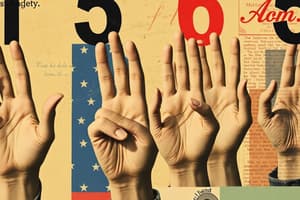Podcast
Questions and Answers
Which hand shape is used to sign the number '1' in ASL?
Which hand shape is used to sign the number '1' in ASL?
- Middle finger extended
- All fingers closed
- Thumb extended
- Index finger extended (correct)
What shape should the palm face when signing ASL numbers?
What shape should the palm face when signing ASL numbers?
- Palm facing upwards
- Palm facing inward (correct)
- Palm facing downwards
- Palm facing outward
How should the fingers be positioned when signing '5'?
How should the fingers be positioned when signing '5'?
- Fingers curled sideways
- Fingers together with palm out
- Fingers slightly open with palm in (correct)
- Fingers folded into the palm
Which finger is used to sign the number '8'?
Which finger is used to sign the number '8'?
What is the correct hand shape for signing the number '10'?
What is the correct hand shape for signing the number '10'?
What is a common mistake when signing the number '9'?
What is a common mistake when signing the number '9'?
When should you double tap while signing numbers?
When should you double tap while signing numbers?
What handshape is used for signing '6'?
What handshape is used for signing '6'?
What is the correct finger position for signing the number 11?
What is the correct finger position for signing the number 11?
How should the fingers be positioned when signing the number 13?
How should the fingers be positioned when signing the number 13?
Which number is signed by extending the index and middle fingers in the shape of a 'V'?
Which number is signed by extending the index and middle fingers in the shape of a 'V'?
What is an appropriate practice suggestion for mastering ASL numbers?
What is an appropriate practice suggestion for mastering ASL numbers?
What is the main focus when transitioning between ASL signs?
What is the main focus when transitioning between ASL signs?
When signing the number 14, which of the following movements should be applied?
When signing the number 14, which of the following movements should be applied?
Why is learning ASL numbers important?
Why is learning ASL numbers important?
What finger position is used to sign the number 15?
What finger position is used to sign the number 15?
Which ASL number requires a flicking motion to show emphasis?
Which ASL number requires a flicking motion to show emphasis?
What should ASL learners focus on to enhance their skills effectively?
What should ASL learners focus on to enhance their skills effectively?
Which of these aspects is NOT emphasized in learning ASL numbers?
Which of these aspects is NOT emphasized in learning ASL numbers?
What does the 'BEND' movement refer to in ASL?
What does the 'BEND' movement refer to in ASL?
Flashcards
Signing Number 11
Signing Number 11
Use your dominant hand with index finger pointing up and a slight flicking motion.
Signing Number 12
Signing Number 12
Use dominant hand (index and middle finger) pointing up with a slight flick to emphasize '2'.
Signing Number 13
Signing Number 13
Using your dominant hand to show '3' with all fingers closed in a bend towards you.
Signing Number 14
Signing Number 14
Signup and view all the flashcards
Signing Number 15
Signing Number 15
Signup and view all the flashcards
ASL Number Importance
ASL Number Importance
Signup and view all the flashcards
ASL Number Practice
ASL Number Practice
Signup and view all the flashcards
Importance of Deaf Culture Awareness
Importance of Deaf Culture Awareness
Signup and view all the flashcards
ASL Number 1
ASL Number 1
Signup and view all the flashcards
ASL Number 2
ASL Number 2
Signup and view all the flashcards
ASL Number 3
ASL Number 3
Signup and view all the flashcards
ASL Number 4
ASL Number 4
Signup and view all the flashcards
ASL Number 5
ASL Number 5
Signup and view all the flashcards
ASL Number 6
ASL Number 6
Signup and view all the flashcards
ASL Number 7
ASL Number 7
Signup and view all the flashcards
ASL Number 8
ASL Number 8
Signup and view all the flashcards
ASL Number 9
ASL Number 9
Signup and view all the flashcards
ASL Number 10
ASL Number 10
Signup and view all the flashcards
ASL Hand Shapes
ASL Hand Shapes
Signup and view all the flashcards
ASL Movements
ASL Movements
Signup and view all the flashcards
ASL Number 11
ASL Number 11
Signup and view all the flashcards
ASL Number 12
ASL Number 12
Signup and view all the flashcards
ASL Number 13
ASL Number 13
Signup and view all the flashcards
ASL Number 14
ASL Number 14
Signup and view all the flashcards
ASL Number 15
ASL Number 15
Signup and view all the flashcards
Study Notes
Learning ASL Numbers 1-15
- ASL numbers use unique hand shapes for each number.
- Proper hand configurations are vital for clarity and comprehension.
- Smooth transitions between hand movements are crucial for understanding.
- Practicing fluent signing improves understanding and communication.
How to Sign Numbers 1-5
- Number 1: Raise the index finger, keeping other fingers folded into the palm.
- Number 2: Extend the index and middle fingers like a "V," with the palm facing inward.
- Number 3: Hold out the middle, index, and thumb fingers, maintaining a natural hand posture, with the palm facing the signer.
- Number 4: Extend the index, middle, ring, and pinky fingers, tucking the thumb, keeping the fingers slightly open and the palm facing inward.
- Number 5: Use the entire hand, keeping fingers slightly open and the palm facing inward.
How to Sign Numbers 6-9
- Number 6: Use the dominant hand, palm facing outward, pinky touching thumb. Double tap for clarity.
- Number 7: Use the dominant hand, palm facing outward, ring finger touching thumb. Double tap for clarity.
- Number 8: Use the dominant hand, palm facing outward, middle finger touching thumb. Double tap for clarity.
- Number 9: Use the dominant hand, palm facing outward, index finger touching thumb. Double tap for clarity. This is similar to the letter "F", so be careful not to confuse.
How to Sign Number 10
- Number 10: Use the dominant hand in an "A" handshape, thumb straight up, with a slight sideways wiggle.
How to Sign Numbers 11-15
- Number 11: Use the index finger, pointing upwards with a slight flicking action for emphasis.
- Number 12: Use the index and middle fingers, pointing upwards, flicking slightly to show "2".
- Number 13: Use the dominant hand to show "3" with all fingers closed together, showing a "bend" movement towards the signer.
- Number 14: Use the dominant hand to show "4", with all fingers closed, and a "bend" movement towards the signer.
- Number 15: Use the dominant hand with all fingers closed to show "5", and a "bend" movement towards the signer.
Practice Tips for Mastering ASL Numbers
- Regular Practice: Dedicate time daily for consistent practice. Use flashcards, ASL videos, and tutors.
- Engage with the Community: Join deaf community events, forums, or classes to interact with native ASL users for better fluency.
Importance of Learning ASL Numbers
- Enhances communication. Learning ASL numbers enables individuals to express quantities, dates, and other numerical information accurately.
- Facilitates seamless interaction between deaf and hearing individuals.
- Forms the basic building blocks for grasping basic ASL proficiency.
- Allows for more complex interactions involving counting, purchasing, scheduling, etc.
- Fosters cultural awareness about Deaf culture.
Studying That Suits You
Use AI to generate personalized quizzes and flashcards to suit your learning preferences.




